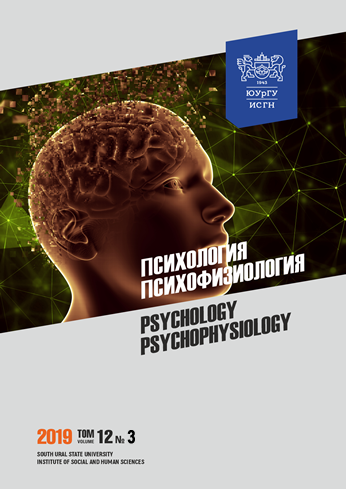ETHNOCULTURAL DIFFERENCES IN IMPLICIT REPRESENTATIONS ABOUT A VIABLE PERSON
Abstract
Aim. The idea of studying implicit representations about a resilient person in the crosscultural context is of great interest in establishing the strategies of resilience. Materials and methods. At first stage, the associative experiment was conducted based on responses to a “resilient person” stimulus. At the next stage, the method of subjective scaling was used. The results obtained were processed with factor analysis using the Statistica 15.0 software. Results. Various factor structures of mental representations of a resilient person were revealed. Conclusion. During the study, it was revealed that ordinary representations about a resilient person in respondents from Russia, Kazakhstan and the USA possess similarities and differences. All respondents associate high resilience with the meaning of life, optimism and love of life. Respondents emphasize a high significance of determination, adaptability, self-development and personal growth. The factor structure of implicit representations in Russian students matched the results of an earlier factorization in adult Russians. Pronounced cross-cultural differences were revealed in associations
regarding family. These associations are significant for students from Kazakhstan and the USA but do not fall into the area of significance for Russians. Young people from the USA perceive the family as something that contributes to one’s resilience. Kazakh students associate resilience with the ability to create and maintain a family, to meet the hope of parents. Kazakh students consider the meaning of life, optimism, humanity, faith in God (Allah), service to him, humility (“not to be proud”) as the main things for maintaining resilience. For Russians and Americans, their pride and self-esteem are considered as more important in maintaining resilience. For Americans, resilience is determined by strength and endurance. Russian students are convinced that a resilient person consists of determination, independence, intelligence, adaptive abilities and success.
Downloads
Copyright (c) 2019 Psychology. Psychophysiology

This work is licensed under a Creative Commons Attribution-NonCommercial-NoDerivatives 4.0 International License.



